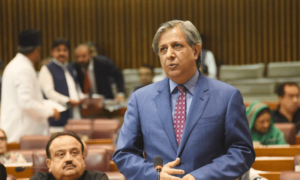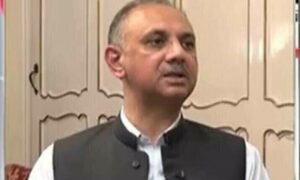• Qatar’s Al-Thani, US president say phased plan includes release of prisoners by both sides, withdrawal of Israeli forces from Gaza
• Israeli govt expected to ratify deal today; Egypt announces plans to re-open Rafah
• Leaders hail, Trump ‘takes credit’ for ceasefire announcement before White House
DOHA: There were celebrations among Palestinians on Wednesday after US and Qatari leaders announced that Israel and Hamas had agreed to a ceasefire in Gaza — starting on Sunday — and a hostage and prisoner exchange, after 15 months of war.
“The two belligerents in the Gaza Strip have reached a deal on the prisoner … swap, and (the mediators) announce a ceasefire in the hopes of reaching a permanent ceasefire between the two sides,” Qatar’s Prime Minister Sheikh Mohammed bin Abdulrahman bin Jassim Al-Thani said on Wednesday night.
Speaking at the White House just days before he leaves office, a visibly relieved President Joe Biden said the negotiations to halt the Gaza conflict had been some of the “toughest” of his career.
“I’m deeply satisfied this day has come, finally come,” he said in a televised statement.
Israeli President Isaac Herzog, who holds a largely ceremonial role, said the deal was the “right move”, while the office of Israeli Prime Minister Benjamin Netanyahu cautioned that some issues in the framework remained “unresolved”, though it hoped the “details will be finalised tonight”.
The first phase of the deal would see Hamas release 33 captives, Al-Thani said, “including civilian women and female recruits, as well as children (and) elderly people… in return for a number of prisoners who are being held in Israeli prisons”.
Pressure to put an end to the fighting had ratcheted up in recent days, as mediators Qatar, Egypt and the United States intensified efforts to cement an agreement.
On Wednesday, Qatar’s PM said the three countries would monitor the implementation of the ceasefire via a body based in Cairo.
Hamas said its delegation had handed mediators its approval for the ceasefire agreement and return of prisoners.
Hamas’ acting Gaza chief Khalil al-Hayya said in a televised address on Wednesday that Israel failed to achieve its goals in Gaza, shortly after a ceasefire deal was announced.
He also vowed the Palestinian group will neither forgive or forget.
Another Palestinian official, who asked not to be named, earlier told Reuters that Hamas had given verbal approval to the ceasefire and prisoner return proposal and was awaiting more information to give final written approval.
Trump takes credit
The agreement follows months of on-and-off negotiations, conducted by Egyptian and Qatari mediators, with the backing of the United States, and comes just days ahead of the Jan 20 inauguration of US President-elect Donald Trump, who rushed to claim credit for the deal on Thursday.
“We have a deal for the hostages in the Middle East. They will be released shortly. Thank you!” Trump said on his Truth Social network, before any official announcement from outgoing President Joe Biden’s White House.
“This EPIC ceasefire agreement could have only happened as a result of our Historic Victory in November,” Trump added in a lengthy second post.
EU Commissioner for the Mediterranean Dubravka Suica hailed the ceasefire deal, saying the bloc “remains committed to supporting all efforts towards a long-lasting peace and recovery”.
Turkish Foreign Minister Hakan Fidan said the ceasefire deal between Israel and Hamas, to halt fighting in Gaza, is an important step for regional stability.
Speaking to reporters in Ankara, Fidan also said Turkish efforts for a two-state solution to the Israeli-Palestinian conflict will continue.
Spanish Prime Minister Pedro Sanchez on Wednesday welcomed the news, saying it “is crucial to achieving regional stability”.
“This ceasefire opens the door to a permanent end to the war and to the improvement of the poor humanitarian situation in Gaza,” German Chancellor Olaf Scholz said on X.
Welcoming the ceasefire deal, Egyptian President Abdel Fattah al-Sisi pointed to the “importance of accelerating the entry of urgent humanitarian aid” into Gaza.
Meanwhile, Egyptian state media reported that coordination was underway to “open the Palestinian Rafah crossing to allow the entry of international aid” into Gaza.
Egypt was “preparing to bring in the largest possible amount of aid to the Gaza Strip”, the report said.
If successful, the planned phased ceasefire could halt fighting that has left much of Gaza in ruins, displaced most of the enclave’s pre-war population of 2.3 million.
That in turn could defuse tensions across the wider Middle East, where the war has stoked conflict in the Israeli-occupied West Bank, in Lebanon, Syria, Yemen and Iraq, and raised fears of all-out war between arch regional foes Israel and Iran.
What next?
If all goes smoothly, the Palestinians, Arab states and Israel still must agree on a vision for post-war Gaza, a formidable challenge involving security guarantees for Israel and billions of dollars in investment for rebuilding.
One unanswered question is who will run Gaza after the war.
Israel has rejected any involvement by Hamas, which had ruled Gaza since 2007, but it has been almost equally opposed to rule by the Palestinian Authority, the body set up under the Oslo interim peace accords.
Published in Dawn, January 16th, 2025
- Desk Reporthttps://foresightmags.com/author/admin/
- Desk Reporthttps://foresightmags.com/author/admin/
- Desk Reporthttps://foresightmags.com/author/admin/
- Desk Reporthttps://foresightmags.com/author/admin/







